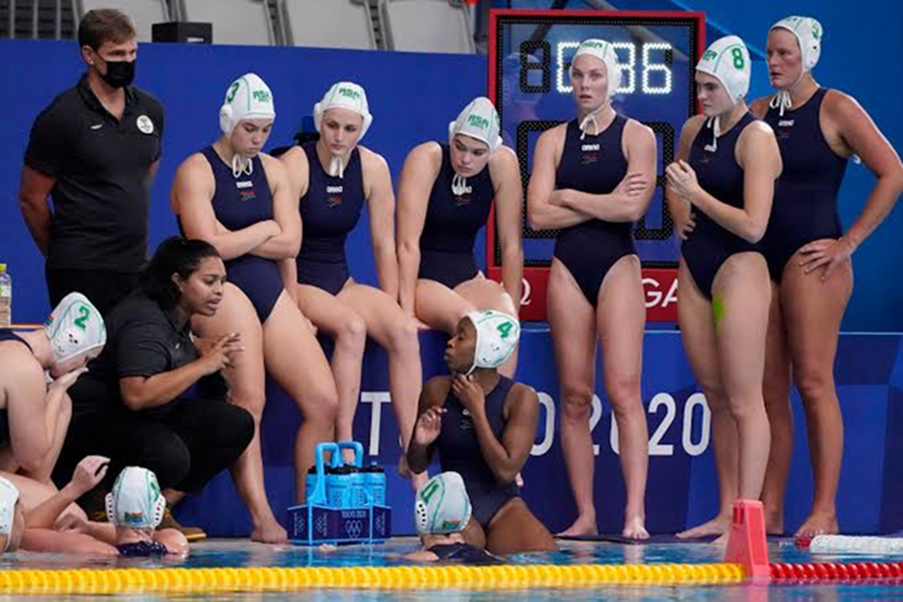Swimming South Africa’s (SSA’s) shaky relationship with water polo came to a head recently when the national men’s and women’s water polo sides found out that neither side would be going to the upcoming Paris Olympics, despite qualifying as continental representatives.
But the turbulence is not new, and the crash has been a long time coming.
Over the last few years, several water polo coaches have stated their dissatisfaction with their treatment by SSA.
This has largely been kept under wraps because of SSA threatening disciplinary hearings and suspensions.
Brett Redelinghuys, a former member of an SSA technical committee for water polo, was banned by SSA in 2022 following a disciplinary hearing that was conducted without the presence of either Redelinghuys or his lawyer who were unavailable due to receiving only five days’ notice of the three-day hearing.
Redelinghuys is appealing against the ban but — in standard SSA fashion — has had no communication from SSA CEO Shaun Adriaanse or John Slater, whom SSA hired as its independent convenor for the hearing.
The reason for Redelinghuys’ 10-year ban from the federation stems from his attempt to set up an independent water polo committee which still falls under the SSA umbrella.
 Dane Tucker of South Africa in action during the World Aquatics Men's Water Polo World Cup Division 2 Qualifier Final 7th-8th Place Match New Zealand vs South Africa at Schwimm- und Sprunghalle im Europa-Sportpark (SSE) on 7 May 2023 in Berlin, Germany. (Photo: Maja Hitij / Getty Images)
Dane Tucker of South Africa in action during the World Aquatics Men's Water Polo World Cup Division 2 Qualifier Final 7th-8th Place Match New Zealand vs South Africa at Schwimm- und Sprunghalle im Europa-Sportpark (SSE) on 7 May 2023 in Berlin, Germany. (Photo: Maja Hitij / Getty Images)
SSA hierarchy
SSA oversees water polo, along with open water swimming, swimming, artistic swimming and diving. That’s five sports with five very different types of expertise.
The SSA hierarchy structure works as follows: there is an executive at the top, which includes the president, Alan Fritz, a treasurer, three vice-presidents, the chief executive officer, Shaun Adriaanse, several general members, three honorary life presidents and members.
Below the executive are technical committees for every sporting discipline under SSA — whose duty it is to run their respective sports.
The responsibilities of the technical committees include, but are not limited to, running the long-term and strategic planning of the sport as well as ensuring teams are selected, submitted and verified.
These decisions are then rubber-stamped by the executive. According to several sources within national water polo, the involvement of the technical committee in this process is bypassed.
Redelinghuys has started WaterPolo4Change, an initiative born out of this discontent. The plan is, according to WaterPolo4Change’s manifesto, to “legally change the SSA constitution at the next SSA AGM [annual general meeting] in August of 2024, that will allow SA Water Polo to run its own affairs”.
The proposal boils down to each discipline under SSA’s umbrella having a seat at the executive table and making decisions for their sport.
“At the top, what should happen is you should have the president of water polo and the other disciplines meeting on an executive [level] and run SSA like that,” Redelinghuys told Daily Maverick.
A failing sport
While there is evidence of the success of this model in several other countries that have professionalised water polo, South Africa has a unique set of problems.
The water polo structure under SSA is in disarray, with players, coaches and technical committee members unhappy with the way the system is run and how they are treated.
Many of South Africa’s best performances at the Olympic Games have come in the pool — from Penny Heyns in 1996 to the Awesome Foursome of Roland Schoeman, Ryk Neethling, Lyndon Ferns and Darian Townsend in 2004. More recently, Chad le Clos and Tatjana Schoenmaker have flown SA’s flag high.
Swimming is largely an individual sport, which makes it much easier to train the participants than in a team sport such as water polo.
Water polo squads of around 15 players need structured training camps to build cohesion.
For the World Aquatics Championships in Doha in February — where both the men’s and women’s teams were told by SSA to finish in the top 12 to qualify for the Olympics — the teams were thrust together for the first time at the weekend before the event.
There is little to suggest that there is any long-term planning by SSA, which makes improvement at the highest level extremely difficult, if not impossible.
All national training camps need to be signed off by the SSA CEO. This rarely happens.
Daily Maverick’s request to see SSA’s high-performance plan for the next Olympic cycle has been ignored along with several other questions about the water polo situation.
Far from helping teams to reach their potential, SSA is hindering them. The overseeing body is, at the very least, complicit in the current poor performance levels of SA water polo teams.
Several members of the men’s and women’s national water polo teams have quietly retired from the sport following the Olympic qualification debacle. DM




 Dane Tucker of South Africa in action during the World Aquatics Men's Water Polo World Cup Division2 Qualifier Final 7th-8th Place Match New Zealand v South Africa at Schwimm- und Sprunghalle im Europa-Sportpark (SSE) on 7 May 2023 in Berlin, Germany. (Photo: Maja Hitij/Getty Images)
Dane Tucker of South Africa in action during the World Aquatics Men's Water Polo World Cup Division2 Qualifier Final 7th-8th Place Match New Zealand v South Africa at Schwimm- und Sprunghalle im Europa-Sportpark (SSE) on 7 May 2023 in Berlin, Germany. (Photo: Maja Hitij/Getty Images) 